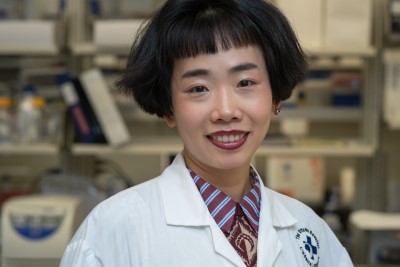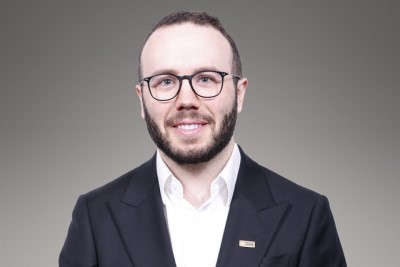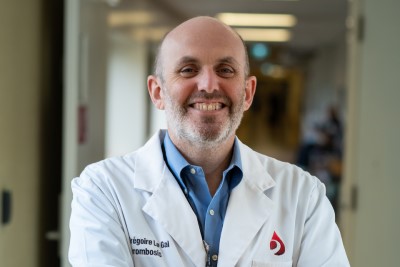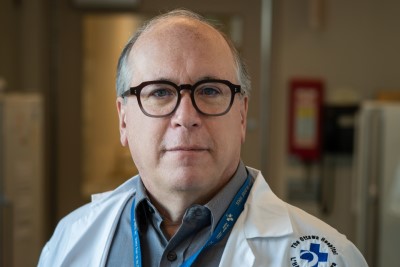Each year, The Ottawa Hospital and its Research Institute honour a small number of outstanding researchers for discoveries and innovations that are improving patient care at TOH and advancing science around the world. This year’s honourees have led game-changing discoveries and clinical trials in areas such as cell therapy, surgical pain management, blood clots, and embryo development.
Meet them here:
 Building better stem cell therapies for critically ill patients
Building better stem cell therapies for critically ill patients
Yuan Tan always dreamed of exploring outer space. In the meantime, she’s investigating the mysteries of the immune system under the supervision of Drs. Duncan Stewart and Shirley Mei. Her PhD research has provided new insights into how mesenchymal stem cells (MSCs) can boost the immune system of critically ill patients fighting sepsis or viral lung infections like COVID-19 and the flu. Her findings in the lab have opened new doors for developing better MSC therapies for these devastating diseases with greater potential to improve patient outcomes. Yuan also helped her team bring two MSC therapies from the lab into clinical trials by leading the development of cell manufacturing processes and tests required by Health Canada. She constantly seeks out the newest technologies and ideas to help her team make their ambitions a reality. For her impressive contributions to cell therapy and immunology, PhD student Yuan is receiving the Worton Researcher in Training Award. Learn more about Yuan in this Q&A.
Improving recovery after surgery using a collaborative approach
 Anesthesiologist Dr. Michael Verret wants the best recovery and pain control for his patients during and after surgery. For his PhD supervised by Drs. Dean Fergusson and Manoj Lalu, he studied opioid minimization strategies in surgical patients including non-opioid pain medications. Painkillers called gabapentinoids were removed from surgical guidelines after his team found they did not meaningfully reduce pain after surgery and had serious side effects. Dr. Verret also identified the most promising medications that could reduce opioid use and improve recovery and pain after surgery. The drugs dexmedetomidine and lidocaine were on the top of the list, and he plans to test their effectiveness in a large clinical trial as he starts his career as a clinician-scientist at Université Laval in Québec City. He partnered with diverse stakeholders and people with lived experience to ensure his research focused on what mattered to them most, including quality of recovery and the impact of pain on daily life. For his innovative contributions to surgical pain control and patient-oriented research, Dr. Verret is receiving the Grimshaw Researcher in Training Award. Learn more about Dr. Verret in this Q&A.
Anesthesiologist Dr. Michael Verret wants the best recovery and pain control for his patients during and after surgery. For his PhD supervised by Drs. Dean Fergusson and Manoj Lalu, he studied opioid minimization strategies in surgical patients including non-opioid pain medications. Painkillers called gabapentinoids were removed from surgical guidelines after his team found they did not meaningfully reduce pain after surgery and had serious side effects. Dr. Verret also identified the most promising medications that could reduce opioid use and improve recovery and pain after surgery. The drugs dexmedetomidine and lidocaine were on the top of the list, and he plans to test their effectiveness in a large clinical trial as he starts his career as a clinician-scientist at Université Laval in Québec City. He partnered with diverse stakeholders and people with lived experience to ensure his research focused on what mattered to them most, including quality of recovery and the impact of pain on daily life. For his innovative contributions to surgical pain control and patient-oriented research, Dr. Verret is receiving the Grimshaw Researcher in Training Award. Learn more about Dr. Verret in this Q&A.
Keeping hospitalized patients safe from bleeds and blood clots
 Dr. Grégoire Le Gal knows that up to one quarter all blood clots happen in hospital, which is why all admitted patients are usually given blood thinners. However, it was unclear whether these drugs actually prevented serious clots in these patients. To find out, Dr. Le Gal and colleagues ran a clinical trial in 47 sites in France and Switzerland where 2,559 hospitalized patients over the age of 70 were given either a blood thinner or placebo for up to two weeks. The trial found that blood thinners did not reduce the risk of blood clots in these patients, who had a wide variety of illnesses. These findings, published in NEJM Evidence, have reduced blood thinner use for hospitalized patients at low risk of clots, resulting in fewer side-effects for patients and cost-savings for hospitals. Dr. Le Gal is planning an international trial to see whether applying AI to a hospitalized patient’s records can help physicians decide whether they would benefit from blood thinners. For this innovative and practice-changing trial, Dr. Le Gal is receiving the Chrétien Researcher of the Year Award. Learn more about Dr. Le Gal in this Q&A.
Dr. Grégoire Le Gal knows that up to one quarter all blood clots happen in hospital, which is why all admitted patients are usually given blood thinners. However, it was unclear whether these drugs actually prevented serious clots in these patients. To find out, Dr. Le Gal and colleagues ran a clinical trial in 47 sites in France and Switzerland where 2,559 hospitalized patients over the age of 70 were given either a blood thinner or placebo for up to two weeks. The trial found that blood thinners did not reduce the risk of blood clots in these patients, who had a wide variety of illnesses. These findings, published in NEJM Evidence, have reduced blood thinner use for hospitalized patients at low risk of clots, resulting in fewer side-effects for patients and cost-savings for hospitals. Dr. Le Gal is planning an international trial to see whether applying AI to a hospitalized patient’s records can help physicians decide whether they would benefit from blood thinners. For this innovative and practice-changing trial, Dr. Le Gal is receiving the Chrétien Researcher of the Year Award. Learn more about Dr. Le Gal in this Q&A.
Helping eggs and embryos become healthy babies
 Babies conceived through in vitro fertilization owe their success in part to the collaborative research of Dr. Jay Baltz. When this technology was first introduced, there was no rule book on how to culture embryos to ensure safe and healthy pregnancies. Dr. Baltz’s basic and translational work on egg and early embryo development had important implications for the make-up of the solution in which human embryos are grown. Dr. Baltz also held leadership roles in the Canadian Fertility and Andrology Society, the Canadian Institutes of Health Research (CIHR) Program on Oocyte Health and the CIHR Stem Cell Oversight Committee. He also led and developed the CIHR Training Program in Reproduction and Early Development and the Impact on Health which helped shape over 70 reproductive research trainees from 2009 to 2015. At The Ottawa Hospital’s Research Institute, Dr. Baltz has been a tireless advocate for trainees as the Associate Scientific Director, Trainees, a position he held from 2005 to 2024. For his global leadership in reproductive biology and fertility research, he is receiving the Grimes Career Achievement Award. Learn more about Dr. Baltz in this Q&A.
Babies conceived through in vitro fertilization owe their success in part to the collaborative research of Dr. Jay Baltz. When this technology was first introduced, there was no rule book on how to culture embryos to ensure safe and healthy pregnancies. Dr. Baltz’s basic and translational work on egg and early embryo development had important implications for the make-up of the solution in which human embryos are grown. Dr. Baltz also held leadership roles in the Canadian Fertility and Andrology Society, the Canadian Institutes of Health Research (CIHR) Program on Oocyte Health and the CIHR Stem Cell Oversight Committee. He also led and developed the CIHR Training Program in Reproduction and Early Development and the Impact on Health which helped shape over 70 reproductive research trainees from 2009 to 2015. At The Ottawa Hospital’s Research Institute, Dr. Baltz has been a tireless advocate for trainees as the Associate Scientific Director, Trainees, a position he held from 2005 to 2024. For his global leadership in reproductive biology and fertility research, he is receiving the Grimes Career Achievement Award. Learn more about Dr. Baltz in this Q&A.
The Ottawa Hospital is a leading academic health, research and learning hospital proudly affiliated with the University of Ottawa and supported by The Ottawa Hospital Foundation.
